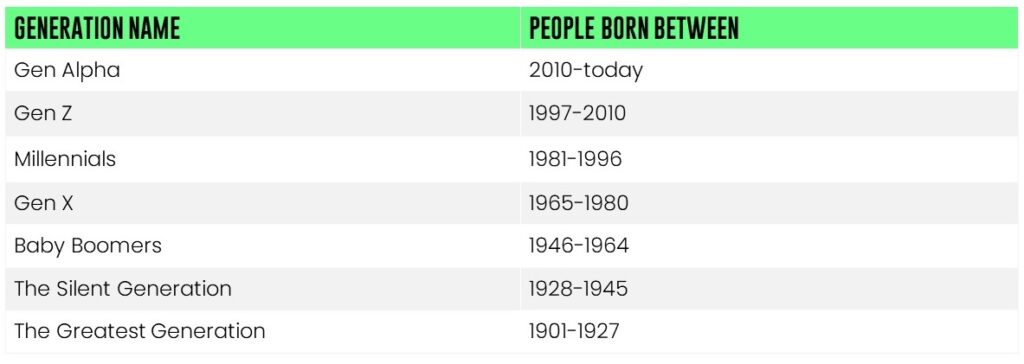Gen Alpha Characteristics and Should You Use Them in PR?
The first truly digitally native generation, born entirely in the 21st century, will approach technology, the media, and the world around them in a different way from those who have come before. What characteristics will define generation Alpha and what will that mean for marketers and how brands communicate with them?
Let’s begin with the basics: when did generation Alpha start and how is it defined? Generation Alpha refers to people born between 2010 and 2024. The oldest members of the gen alpha cohort are now teenagers, but even before they have spending power of their own, they’re already influencing parental spending habits.

Before the end of this decade, gen Alpha’s estimated economic footprint is predicted to be $5.46tn – they’re going to be a large and influential generation. In fact, as soon as 2025, there’ll be more gen Alphas in the world than baby boomers.
Here are five things you need to know about generation Alpha:
1. They Are Digital Natives From Birth
Gen Zs were almost digital natives, but this concept is fully realised with gen Alpha. With the eldest of the cohort being born in 2010, the year that also saw both Instagram and the iPad launched, gen Alpha have never known life without the enabling technology that previous generations adopted as it emerged, and this is a defining feature of the characteristics that will shape how they approach they world.
They’re not just ‘borrowing’ parental devices. Around a quarter of five- to seven-year-olds have a smartphone, while three quarters use a tablet. By the age of 10, 58% of gen Alphas have a smartphone, rising to 97% of 12-year-olds in the UK.
The pandemic – an enormously significant experience in gen Alphas lives to date – accelerated education’s adoption of technology as a learning and communication tool, rapidly increasing school-age gen Alpha’s use of iPads. Post-pandemic, this trend hasn’t reversed and gen Alpha, sometimes rather pejoratively referred to a ‘iPad kids’, are using technology for learning as much as for entertainment.
The mobile element of their usage is crucial to note. Brands need responsive, mobile-first approaches so that these digital natives have a seamless experience, no matter where they’re interacting with a brand.
2. They’re being Raised By MILLENNIALs
In the main, gen Alphas are being raised by millennials, leading some to dub them “mini-millennials”. Millennial parents are big users of social media, very switched on about environmental and societal issues, aware of health and wellbeing, and conscious about how they are raising their children. All of this is trickling down to influence what is shaping gen Alpha’s characteristics, views and values.
In recent years, the pandemic and cost-of-living crisis has limited the extent to which some millennials have had the financial capacity or freedom to make choices based on their values. Greater levels of financial security for gen Alpha in the future, may well lead to a greater willingness – and ability – for gen Alpha to prioritise spending with brands whose values reflect their own. Gen Alphas are already expressing a personal desire to make a difference to the world, and they’ll want to see organisations behave with integrity over how they approach environmental and societal issues.
3. They Love Gamification and Interactivity
In the UK, 60%of children aged three to 17 (extending just beyond the upper limit of gen Alpha) game. And the majority of these, 67%, use games to communicate with friends. While millennials and gen Z love their social platforms, generation Alpha are embracing the world of gaming as somewhere they play, learn, build, explore and interact.
Immersive creation games are winning legions of gen Alpha fans, with Minecraft, Roblox and Fortnite – all games with extensive customisation functionality – taking the top spots for gen Alpha usage. In fact, it’s the games with building/creating tools that have seen the highest demand growth since 2021, demonstrating the innate thirst for imaginative, creative outlets among these children.
Creating content that blends entertainment, education and creativity gives brands a chance to engage in a meaningful way with a generation characterised by an active desire for digital connection and inspiration.
4. They’ll Make Less Distinction Between The Virtual and Real World
While it’s easy to see everything connected to this generation through the prism of their relationship with technology, data from 2023 showed a trend of them moving offline. This is an entirely understandable reaction to the opening back up of society post-lockdown, but it also relates to a generation that’s already well-versed in mental health and wellbeing issues and looking for balance.
So, their experience and interests are by no means entirely online, but where this generation is likely to differ is that the ubiquitous nature of technology in their lives will mean they’ll make less distinction between the digital and physical experience, interacting with and purchasing from brands in both virtual and real-world settings.
This opens doors for artificial intelligence (AI), augmented reality (AR) and virtual reality (VR) to enhance how they navigate the world. From Vans creating a skate-park hangout in Roblox mirroring its ‘IRL’ skate-parks, to theme parks using AI to personalise experiences, and cultural institutions such as the V&A examining how they can tailor their online and offline offerings to meet the needs of future generations, brands blending the physical and virtual will be a step ahead.
5. They’LL Be Exacting Customers
As a generation used to instant communication, personalisation and convenience, a key characteristic of gen Alpha is likely to be a expectation of speed, responsiveness, and customisation in their dealings with brands. Technology makes much of this significantly more achievable for businesses, but reliance on technology mustn’t be to the detriment of quality customer connection.
The direction of travel in all things brand loyalty-related has been that it’s getting harder for brands to capture and retain loyalty. When today’s – and tomorrow’s – consumers are disappointed by a brand’s ethical stance, products or customer service, their complaints are more widely broadcast via social media, and pose a greater risk of reputational damage. Brands need to engage with customers in an authentic way to build strong customer relationships.
So, when do marketers need to start thinking about generation Alpha? The short answer is now. Obviously, there are brands for whom gen Alpha isn’t yet of relevance, and others for whom gen Alpha is already a primary market. But this group’s coming significance means all brands need to consider how they’re going to adapt and work with this generation.
And, if you’re already wondering what generation will come after gen Alpha, the answer is generation Beta (although hopefully someone will coin a better phrase for them than this decidedly underwhelming moniker), and they’ll start being born in 2025.
The author: Jane Ainsworth is managing director of WPR. She has more than 25 years’ experience in developing and delivering communications strategies and impactful consumer PR for brands including Dunelm, Tesco, Warner Leisure Hotels, Greene King, Alton Towers, Beaverbrooks and Oxfam.

WPR is an award-winning PR agency, based in Birmingham, renowned for getting the world talking about the brilliant brands we work with. We specialise in consumer PR, across sectors including food and drink, retail and leisure; B2B PR, where we work with companies spanning manufacturing, construction and HVAC industries; and social media.
To start a conversation about how we can get the world talking about your business, please get in touch – we’d love to chat.
